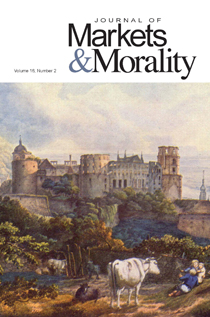 The most recent issue of the Journal of Markets & Morality, vol. 16, no. 2, has been published online at our website (here). This issue’s articles explore a range of subjects from biblical understandings of poverty, Islamic scripture, John Locke, the ills of apathy, an Eastern Orthodox view of the family and social justice, and much more.
The most recent issue of the Journal of Markets & Morality, vol. 16, no. 2, has been published online at our website (here). This issue’s articles explore a range of subjects from biblical understandings of poverty, Islamic scripture, John Locke, the ills of apathy, an Eastern Orthodox view of the family and social justice, and much more.
In addition, this issue includes our regular symposium of the papers from the Theology of Work Consultation at the Evangelical Theological Society’s 2012 conference.
2013 marked several important anniversaries, as executive editor Jordan Ballor points out in his editorial,
The year 2013 marks the 450th anniversary of two significant events in this development of the Protestant and Roman Catholic reformations. In the latter case, 1563 saw the conclusion of the Council of Trent, the first session of which had opened in 1545, with the twenty-fifth and final session convened on December 3–4, 1563.
He continues,
Likewise the sixteenth century was a period of significant Protestant attempts at articulation and codification of doctrinal truth in the face of controversy and opposition. The publication of confessions such as the Heidelberg Catechism in 1563, along with the promulgation of the Thirty-Nine Articles of England that same year, in some ways signals a transition from the second to the third generation of Reformed theological development. Although certainly not primarily a document concerned with economic matters, the Heidelberg Catechism has achieved a level of international recognition and appreciation in large part because of its practical focus and pastoral tone. Appreciation for its 129 pairs of questions and answers led to, as Philip Schaff put it, the Heidelberg Catechism’s possession of “the pentecostal gift of tongues in a rare degree.”
Jordan’s editorial is open access here.
Regarding the Heidelberg Catechism, though Jordan notes that it is not primarily “concerned with economic matters,” its treatment of the Ten Commandments, and the Eighth Commandment in particular (“you shall not steal”), offers foundational principles for Christian economic ethics.
Accordingly, our Status Quaestionis feature is a translation of Abraham Kuyper’s “Commentary on the Heidelberg Catechism Lord’s Day 42,” which deals with the Eighth Commandment. Among many other challenging passages, Kuyper writes,
Even if I were to think of ownership exclusively in terms of the relationship it entails between one person over against another, the concept of sovereignty still brings me back again and again to the Lord God because he has sovereign command over those two people whose right of ownership you are regulating. Whether you think of the object or of the person, you must always take your point of departure in the Lord our God because both object and person exist only by his grace. He created both the object and the person. Thus, too, the people whose right of ownership you seek to regulate are not free to act as they will and please, but in the regulation of ownership both are bound to submit themselves in obedience to God. The eighth commandment itself shows this.
In typical Calvinist fashion, Kuyper exhorts Christians to begin their reflection on the nature and limits of private property with the sovereignty of God. His reflection is insightful and nuanced and its challenge and relevance spans beyond his own Reformed tradition, offering biblically-informed and socially-sensitive reflection on such a vital topic for all Christian engagement with the morality of the marketplace.
If you do not currently have a subscription to the Journal of Markets & Morality, now would be a good time to consider it. Sign up here today!
Subscription information and prices can be found here.
In addition, the publication of this issue means that our Fall 2012 issue (15.2) is now open access on our website here.

